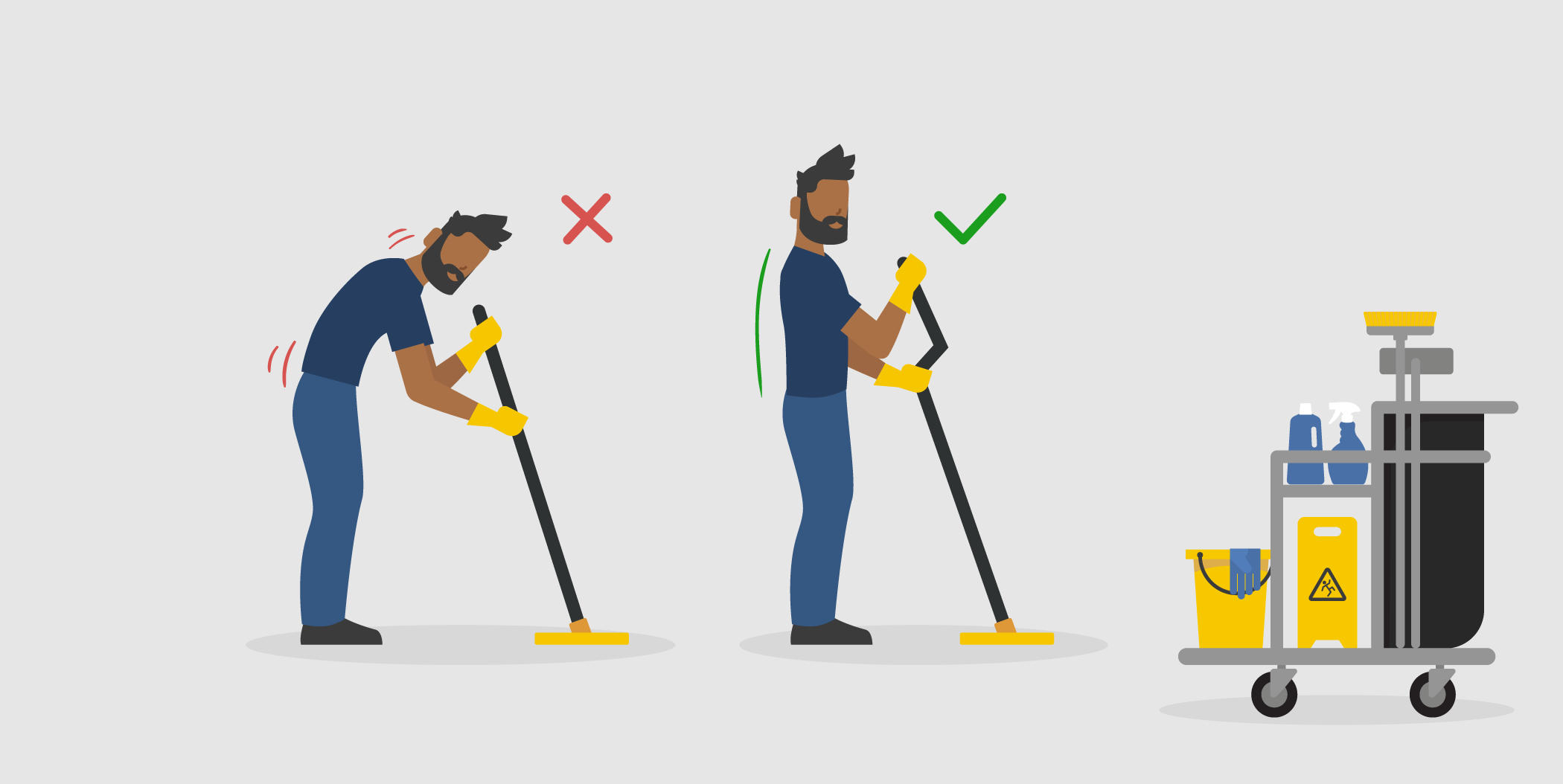Speed. Precision. Stamina. That’s what keeps the cleaning industry moving — day after day. But behind every sparkling surface, there’s often a hidden cost: sore backs, tired shoulders, and long-term strain that can sideline even your best workers. That’s why ergonomics in cleaning isn’t a “nice-to-have” – it’s essential. Healthy, capable staff are the backbone of every successful cleaning business. In this article, we’ll explore how simple ergonomic improvements can keep your team healthier, happier, and more productive — and how small changes today can build a stronger business for tomorrow. The Hidden Strain: Why Cleaning Takes a Physical Toll If you run or manage a cleaning team, you’ve probably seen it firsthand: A cleaner twisting awkwardly to reach under furniture Someone lugging a heavy vacuum up the stairs Long shifts of repetitive motion with little rest in between Each of these moments may seem minor — but over time, they add up.The result? Back pain, joint strain, fatigue, and frustration. For employers, the impact runs deeper. Poor ergonomics lead to slower productivity, more sick days, and higher costs. It doesn’t just affect your staff — it affects your bottom line. But the good news? Fixing it doesn’t have to […]
Category: Advice
How to Master Cleaning Business Leadership in 2025
Leading a cleaning business isn’t easy, and 2025 will bring both new opportunities and challenges. Between managing employees, handling customer expectations, and keeping up with rules, leadership can feel overwhelming. But with the right tools and strategies, you can reduce stress, improve efficiency, and spend less time on paperwork. Here’s a simple guide on how to make your business run smoother in 2025. Cleaning Trends that Will Define Leadership in 2025 In 2025, successful leaders will be those who embrace the latest trends and stay ahead of industry changes. However, great leadership is not just to follow trends— great leaders strategically adapt them to fit their business needs, rather than diving head first into the evolving landscape. Stressless Leadership with Technology Many leaders are already exploring how technology can support their teams and improve daily operations. If you’re considering automation, here’s how you can start: Management Steps for Technology and Digitalisation 1. Begin Your Automation Journey Invest in cleaning robots to handle repetitive tasks and reduce the physical strain on employees. 2. Start Using Digital Planning Simplify scheduling and resource management with tools like CleanManager. 3. Simplify Complex Tasks Use AI systems and drones to manage large-scale or difficult cleaning […]
Bridging Generations: The Power of a Multi-Generational Workforce in the Cleaning Industry
The workforce is more diverse than ever before, presenting significant advantages for businesses. Today, multiple generations work side by side, from Baby Boomers to Millennials and Generation Z. But how can cleaning businesses successfully unite different generations? And why is this particularly important in the UK cleaning industry? This article explores how multi-generational teams can go beyond just coexisting to become a key driver of success. Why Multi-Generational Teams Are the Future The UK cleaning industry is evolving rapidly, driven by technology, sustainability, and rising client expectations. Multi-generational teams combine essential qualities that businesses need to thrive: Younger employees bring tech expertise, fresh ideas, and modern problem-solving approaches. Experienced staff contribute with deep industry knowledge, client insight, and resilience in challenging situations. A 2022 study by AARP found that 83% of business leaders consider age-diverse teams to be crucial for long-term success. Why? Because different perspectives lead to innovation – a major competitive advantage in a changing industry. Benefits of Multi-Generational Teams in the Cleaning Industry 1. Innovation and Knowledge Sharing The combination of experience and fresh thinking allows businesses to develop better solutions than any single generation could achieve alone: Experienced staff bring proven cleaning techniques, client relationship management, […]
The Future of UK Cleaning: Trends to Watch in 2025
The Cleaning Industry is facing a series of significant changes and trends in 2025. New laws, technological advancements, sustainability, health, and employee well-being are top factors that bring both challenges and opportunities. Here is a rundown of the 2025 trends so you can be ready for the future of cleaning. New Legislations You Should Know From 1 April 2025, the National Minimum Wage will rise by 6.7%, increasing the hourly rate to £12.21 for adults. Young workers will also benefit: 18–20-year-olds: A 16.3% increase to £10/hour. 16–17-year-olds: An 18% increase to £7.55/hour. This change may necessitate adjustments to cleaning company budgets and possibly higher service prices to accommodate the increased payroll costs. Also, starting 31 March 2025, all workplaces in England will be required to separate waste under the Simpler Recycling legislation. Micro-firms will have until 2027 to comply. Non-compliance could result in enforcement actions, such as compliance notices. Cleaners may require additional time to manage multiple waste streams, potentially impacting scheduling. Read more about Simpler Recycling in our blog article, Your Cleaning Company’s Role in Simpler Recycling 2025. How to Stay Ahead 1. New Minimum Wage Adjust your cleaning company’s budget and service price if some of your cleaners […]
Get the newest posts directly in your inbox completely free
Why Your Cleaning Business Needs a Marketing Strategy
Many cleaning businesses start small — with just a bucket and sponge, ready to get to work. While there’s nothing wrong with this, if you at some point wonder why some clients choose you and others don’t, it may be time to consider a marketing strategy. Don’t worry; developing an effective marketing strategy doesn’t have to be complex or time-consuming. Understand Your Target Audience: Who are Your Clients? Your business’s survival depends on your clients, so it’s crucial to understand your target audience when creating a marketing strategy. Are your clients private individuals or businesses? If both, you’ll need to adjust your approach for each audience. Factors like demographics, age, and location can also influence the tone of voice you should use in your marketing materials. Example Margaret runs a cleaning business in London with a strong focus on environmental sustainability. Her team of ten employees travels to cleaning jobs by bike or electric car, servicing homes and flats within a 10-mile radius of central London. Most of her clients are wealthy families who view professional cleaning as a luxury, allowing them more time to enjoy life without the hassle of household chores such as vacuuming and sweeping floors. These […]
How to Advertise Your Cleaning Business Effectively
The competitive cleaning industry requires clear, targeted advertising to ensure that clients choose your service over hundreds of others. But where should you advertise, and what will resonate most with potential clients? While traditional methods like newspaper ads once sufficed, today the digital market offers endless opportunities. Keep reading to explore the best online and offline advertising methods for your cleaning business. 6 Digital Ways to Effectively Promote Your Cleaning Business 1. Create a Website The first and most essential step to advertise your cleaning business is creating a website. This allows potential clients to find your company online. Your website serves as your platform to showcase everything from prices and contact information to your business story. Ensure your website text includes keywords that people are likely to use when searching for cleaning services in your area. This practice, known as SEO (Search Engine Optimisation), involves using relevant keywords and producing quality content to make your website easier to find. Another tip is to include videos on your site, as Google’s algorithm favours video content, and clients often find it more engaging. Videos can convey more than text alone, so get creative and highlight the qualities of your cleaning service […]
How to Make Your Cleaning Business Stand Out from the Competition
The cleaning industry is a significant and growing sector in the UK, fuelled by increased health awareness following Covid-19. It’s also highly competitive, with frequent price bidding, which makes it important to stand out. While clients often look for good prices, they also appreciate great service and shared values. Anyone can offer low prices, but true growth and competitiveness lie in identifying and effectively communicating your cleaning business’s unique strengths to clients. Factors and Trends that Make Your Cleaning Business Stand Out Documentation and Credibility Documenting your cleaning service as a safety net for both you and your staff, providing evidence in case of issues or disputes. It also offers added value to clients, allowing you to show progress and results. This goes hand in hand with quality control, where you ensure that your business consistently meets the standards agreed upon with the client. Consistent documentation and quality control enhance your professionalism and demonstrate your commitment to responsible practices — key factors that make you stand out from the competition. ESG and Sustainability ESG stands for Environmental, Social and Governance. It’s a standard measure of a company’s impact on the environment, society, and its credibility. By prioritising these initiatives, your […]
From Technology Scepticism to Success with Change Management
An array of new cleaning technologies and digital tools are available and ready to use. These technological advancements can effectively tackle staff shortage and the increased demand for cleaning quality caused by Covid-19. But fully embracing digitalisation and technology can be challenging as they disrupt the working routines. Both you and employees often have concerns about implementation time and job displacement. But behold! There are effective strategies to solve these issues through step-by-steps and change management. Let’s delve into these issues and explore potential solutions. Addressing Employee Concerns and Misconceptions about Technology and Digitalisation The quickest way to failure when implementing new technology is to sideline your employees. If you’re aiming for failure, simply enforce changes without involving those who will be directly affected, and watch the project go down the drain. But you want the opposite, of course, so you should do the opposite. To successfully counter employee concerns regarding technology and digitalisation, the first crucial first steps are fostering understanding and communication. Listening to employee concerns and misconceptions provides an overview for constructive action. You can benefit from listening to your employees in their day-to-day work and discussing potential improvements. This will give employees co-influence. For example, conduct […]
Attracting the Young Generation to the Cleaning Industry
One major challenge facing cleaning companies today is attracting and retaining the young generation. To stay relevant in modern times, the industry should embrace environmental- and social sustainability. They also need to address the less favourable aspects of cleaning jobs, while also promoting the positive impacts cleaning has that people tend to forget. Why the Cleaning Industry has to Change The cleaning industry is in a labour shortage, particularly with younger workers. Data from the British Cleaning Council reveals that the percentage of cleaning staff under 25 is significantly lower than in other sectors across the UK. Additionally, there is a much higher percentage of people over 55 in the cleaning industry. The difference may stem from the negative perception of cleaning work as low-skilled, low paid, with little career opportunity and workplace well-being. Therefore, new efforts to recruiting cleaning staff, and especially the younger generation, is needed. To attract younger employees, the industry must shift its narrative. This requires reflection and action. Cleaning companies need to reflect and determine the most important issues and act on it. Otherwise, companies will increase the labour shortage when their employees start to retire and no young workers want to replace them. This […]








